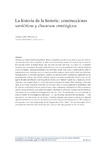Mostrar o rexistro simple do ítem
La historia de la historia: construcciones semióticas y discursos ontológicos
| dc.contributor.author | Magoulas, Charalampos | es_ES |
| dc.date.accessioned | 2014-10-02T12:31:29Z | |
| dc.date.available | 2014-10-02T12:31:29Z | |
| dc.date.issued | 2012 | es_ES |
| dc.identifier.citation | Culture of communication / Communication of culture, 2012: 467-472. ISBN: 978-84-9749-522-6 | es_ES |
| dc.identifier.isbn | 978-84-9749-522-6 | es_ES |
| dc.identifier.uri | http://hdl.handle.net/2183/13342 | |
| dc.description.abstract | [Abstract] "Performing Culture and Breaking Rules" How is it possible to perform more than is required? And yet, isn’t that precisely what is required, in order for an interlocking society of human beings to function, develop and evolve? If human beings only did what we were told to do, we would live in complete monotony and enslavement. If human beings did only what we were permitted to do, nothing interesting would ever happen. Although performance has often been limited to the study of isolated artistic forms of expressions (music, visual arts, etc.), it is equally possible to analyze culture, on the whole, as a behaviourencoding system of rules and regulations, wherein the individual actor’s performative appropriation and reinterpretation of these said (cultural, political, artistic) rules makes possible the culture’s very survival, against all odds and obstacles, over long periods of time, as a “tradition” upheld by a community of rulefollowers / rule-breakers. Rules, in a very real sense, are meant to be broken. Rule-breaking, by the same token, is, as it were, legislated within the very law code itself, as its own guarantee of immortality. After all, what law could function for any period of time without undergoing reinterpretation? This is good news both for culture and for the avant garde (the creative individual or collective), because even the strictest of rules creates its own conditions of transgression, and vice versa. The performance of culture through the creative freedom of the transgressive individual — i.e. any individual qua his or her individuality — is the sine qua non for a democratic society of peers. Creativity depends upon structure, and structure depends upon that which breaks its shackles of normativity, by rebirthing structure transgressively. The whole point of interpreters is to make things alright for the reappearance of the “father” (the law code) again. This is what protestant reformism does. Ironically, then, anarchy is the only guarantee of the rule of law. | es_ES |
| dc.language.iso | spa | es_ES |
| dc.publisher | Universidade da Coruña | es_ES |
| dc.title | La historia de la historia: construcciones semióticas y discursos ontológicos | es_ES |
| dc.type | info:eu-repo/semantics/conferenceObject | es_ES |
| dc.rights.access | info:eu-repo/semantics/openAccess | es_ES |






